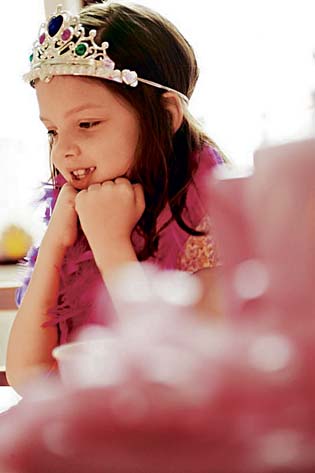
有人說新生代外表好看但內裏軟弱、無能力、缺乏責任感,所以稱他們為"strawberry"(草莓)。而女孩子若在工作上表現幼稚,自我中心,處處計較,把工作推給同事,胡亂黑面發脾氣,就會被形容為患上“公主病”。
“公主病”的個案很常見,“患者”通常是一些剛畢業初出茅廬的女孩子。她們的成長可能一直被當作公主般看待,一旦發現現實世界原來不是她們的童話世界,便會適應不來了。
只模仿盲從無聊事
而學界亦開始研究造成“公主病”的"princess culture"(公主文化)。美國Creighton University的傳理學教授Sheri Shuler還特地向大學申請假期去研究這個問題。其實Sheri Shuler的4歲女兒也喜歡扮公主,故引起她的憂慮。
Sheri Shuler has a four-year-old daughter who is into princesses. Or, rather, Disney princesses and their accoutrements(進行特殊活動所需的配備、裝備).
The dresses, the hair, the tiaras(鑲有寶石的頭飾). This has Shuler concerned. Not the princess part - royalty, both real and fictional, has taught generations of young women the virtues of duty, resourcefulness and re-inventing themselves - but the single-minded frivolity.
Royalty是高貴、莊嚴,virtues of duty是責任感的美德,resourcefulness是足智多謀。學習這些公主的特質,不論是真實的抑或是童話故事虛構的,當然沒問題。Sheri Shuler擔心的是女兒好的方面不學,唯獨是模仿single-minded frivolity(盲從的無聊事)。
小女孩扮公主只是鬧玩,沒有問題,但若她們一直長大,仍擺脫不了這種心態,問題就大了。
Little girls have always swanned around in mom's cast-off party frocks(赴宴穿的裙子) while pretending to boss the staff. But observers are concerned about what princess culture is doing to little girls. And what will happen when little princesses grow up to be insufferable(不可忍受的) adolescents and adults who demand constant adulation(奉承) and access to a bottomless pot of spending money.
心理學家Jean Twenge說,女孩到了15歲,你忽然對她說︰“你不可以再扮公主。”"Why be obsessed with being a princess when you're never going to be one? You can only postpone reality for so long."(既然現實中根本不能變公主,你為何為此陶醉?現實遲早都要面對。)
童年商品化的結果
The Commodification of Childhood的作者Daniel Cook則認為公主文化是把童年商品化的結果:
There are some things about princess culture that are empowering(給予力量) to young girls. The Cinderella(灰姑娘) story is about transformation(轉化). The sad thing is that the transformation now happens not through optimism(積極) and industry(勤奮), but through buying the right products.






